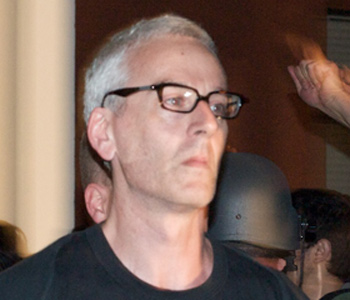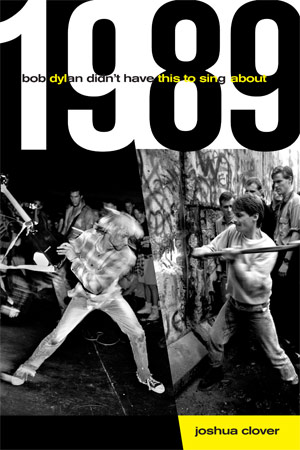
The book is about the experience of the historical moment called “1989,” lasting somewhere between an instant and a few years. More specifically, it’s about a set of feelings, intuitions, sensations, that I think arose in that moment. These are nuanced, elusive and contradictory enough to defy easy description. The book’s suspicion is that the material of culture exists in part to register, capture, and preserve these sensations, these encounters with the stuff of history itself.
The books’ cultural lens is that of popular music, but it’s not really a music book. Those who come looking for the pleasures of pop, not wanting to be vexed by philosophers and political theorists, may be disappointed. The first four chapters detail ways in which pop music in the Anglophone West underwent remarkable changes, in a moment of immense historical change: genre births (acid house and grunge), sea changes (from Black nationalist to gangsta rap), high-water marks (the Hot 100). As fascinating as I find these developments, they serve as empirical studies for the book’s two parallel arguments that follow.
The first is that all those changes in popular music share a single logic. It concerns the vanishing of any sense of intergroup conflict, any sense of challenge or confrontation. This plays out differently within each genre, but finally organizes them into a unity: Antagonisms are internalized wished away, limits avoided or ignored. The second and more significant argument concerns exactly how this dynamic correlates to the sudden disappearance of the century’s great antagonism, a vanishing act we have learned to call “the fall of the Wall.”
When we see that this is what culture was puzzling over, we see also that it is not a purely celebratory occasion—even in the victorious West. The antagonism which had oriented our political thought for decades can no longer do so. We encounter a sense of loss, bewilderment, even emptiness. I am hardly alone in insisting that history didn’t end, despite Francis Fukuyama’s famous claim. But it’s not unreasonable to suggest that the capacity to think historically took a beating. And this has dismaying consequences. Foremost among these consequence is the way in which we lost the ability to imagine that the arrangements of daily life—commodity capitalism, let’s just speak its name, so immiserating and inegalitarian for so may—that this could ever again be open to debate, criticism, or real change.
“If history has in fact ended (as Francis Fukuyama famously claimed), or if the capacity to think historically has disappeared, this has dismaying consequences. Foremost among them is the inability to imagine that the arrangements of daily life, so immiserating for so many, can ever again be open to debate, criticism, or real change.”
1989, in the most basic terms, is a synthesis of cultural criticism and political science, toward an understanding of a complex and important social convulsion.
There is a lot of Public Enemy and Nirvana in the book, Roxette and the KLF. There is also a fair amount of Fredric Jameson, Carl Schmitt, Francis Fukuyama. James Joyce and Hegel make cameos, along with Luce Irigaray and Slavoj Zizek. No less are there meditations on the excellence of Neneh Cherry, George Michael, Rakim, and Scorpions. These figures from the realms of theory and pop culture are set loose, together, on the stage of history: Berlin as the Wall falls; the sequence of revolutions across Europe that shattered the Soviet bloc; the resistance and bloody repression in Beijing’s Tiananmen Square. The radios and televisions and imaginations of America.
Such a mixture is in some way inevitable, I suppose. I was a professional music journalist for a few years, a senior writer at both Spin and the Village Voice. I quit very specifically because I felt, finally, like I couldn’t talk about music in the true language of my political and intellectual commitments. (There was, as I’m sure you could guess, plenty of encouragement to engage in pseudo-political posturing, especially in the glossy nationals. But serious politics, serious ideas, had to be at all costs ironized and denatured).
So in some sense this book is the completion of a trajectory that began quite some time ago, but couldn’t come to rest within the profession. Of course now I’m a academic, and most of my colleagues may think it’s a bit odd—looking from the other side—to be writing about (and enjoying), say, teenpop as something worth approaching with the finest critical technology. I always feel too serious or not serious enough.
However, it’s important to say that I am not smashing together the high (theory) and the low (pop culture) just because I can, just to see if anything interesting happens. I think if you look at the Jesus Jones song that gives the book its subtitle—the chorus, “watching the world wake up from history”—well it’s obvious that the song itself knows about Francis Fukuyama. But not just that. I think it’s cognizant of the famous passage from Ulysses where Stephen Dedalus says that history is “a nightmare from which I am trying to awake.” Which is in turn Joyce working through Hegel and Marx. It’s all there—there’s no need to impose the high and low on each other.
Indeed, they are collapsing toward each other at accelerating speeds. This is a secondary argument of the book. Pop, which openly lives and dies by the logic of the commodity, is compelled to reduce everything down to bite-sized, easily sellable morsels. History itself increasingly drives toward this condition: toward the single image, the single instant. The end of the Cold War seems like a kind of acme of this, where this incredibly elaborate and unfinished historical process can be reduced to one image, five words: “the fall of the Wall.” And so history becomes pop, just as pop becomes the main purveyor of historical thought.
But what do we lose by that condensation, compression, that amputation of complexity? A lot, of course. And I think the songs know this: not just the thrill of the instant, but the redaction of everything else. They know they have blind spots, missing limbs. They feel the loss, the sense that something has become unspeakable, invisible, but is still there. I think we knew this, and cached this knowledge everywhere. We sensed it would be useful knowledge later, when we return to the great antagonisms that I’m sure are still before us.
I think in some sense any portion of the book will give a sense of it at the level of the writing, the way it wants to talk about its subjects. And it’s composed in relatively small sections, a few pages each. But I’m not sure any single passage would get at the arguments or the motion of the book. 1989 builds its case stone by stone—if you’ll forgive the wall metaphor!
For me part of the pleasure is watching the import of some isolated moment—for that’s what pop gives us, isolated moments—slowly become visible as part of a larger dynamic. But I suppose there are a couple favorite parts. The Jesus Jones song, “Right Here, Right Now,” gets taken up twice—once in the Introduction and once at the beginning of Part II. If one were to put these two passages together, one would get a sense of the approach, and how the book develops its account.
Alternately, I’m fascinated by the history of the song “Listen to Your Heart,” by Roxette. There are a couple sections at the end of Part I, in Chapter Four. It’s an example of a song that more or less defines schematic pop cliché, albeit really well-done. One naturally assumes it’s a sort of cipher: catchy, generic, hum it for three weeks and move along, nothing to see here. And yet its historical place is astoundingly rich and particular. This was the Number One song on the charts when the Wall came down. But that’s merely the beginning of its strange relevance, of its unique place in the development of the music biz, and its implausible role in the politics of central Europe.
“The Jesus Jones song itself knows about Francis Fukuyama. But not just that. I think it’s cognizant of the famous passage from Ulysses where Stephen Dedalus says that history is ‘a nightmare from which I am trying to awake.’ Which is in turn Joyce working through Hegel and Marx.”
What sometimes seem like complete episodes turn out to extraordinarily partial, to be awaiting their complement. Some might say that 1989 was answered a dozen years later, the fall of the Wall answered by the fall of the Towers. It seems right to say, at least, that the period 1989-2001 suddenly became visible as a distinct era, a sunny “Pax Americana” (war-filled as every other Pax) in which the US was unchallenged as a global power. But this period was not summer so much as autumn for the US empire. It’s probably more accurate to consider the answering event to be the economic collapse of 2008: “capitalism’s 1989,” let’s call it. Not the end of an idea, but its discrediting on a global scale.
And as a result the very terms that were disallowed, lost, rendered unspeakable in 1989—“communism,” “socialism” even “class”—have returned. They’ve returned in part as mock-up demons for political hysterics. But also as serious topics of conversation: one is at least able to entertain “the communist hypothesis” without appearing purely as a quaint recidivist.
The book is in many ways about the paradoxical feeling which contains both the exultation of triumph, of overcoming, of the end of a struggle—but also the loss of something instantly out of reach, and the haunting feeling it might still matter. This is what is now returning, bit by bit. The book’s topic, the events of 1989: in the moment it all seemed exclusively like the end of a long story, a denouement. But from another perspective it’s merely the preface.


Joshua Clover is an Associate Professor of Poetry and Poetics at the University of California Davis. He has published two books of poetry (Madonna anno domini and The Totality for Kids), winning the Walt Whitman Prize from the Academy of American Poets and appearing in Best American Poetry three times. He wrote the introduction to The Matrix for the British Film Institute; next year, he’ll be a Fellow at the Society for the Humanities at Cornell University, working on a book about poetry and political economy.